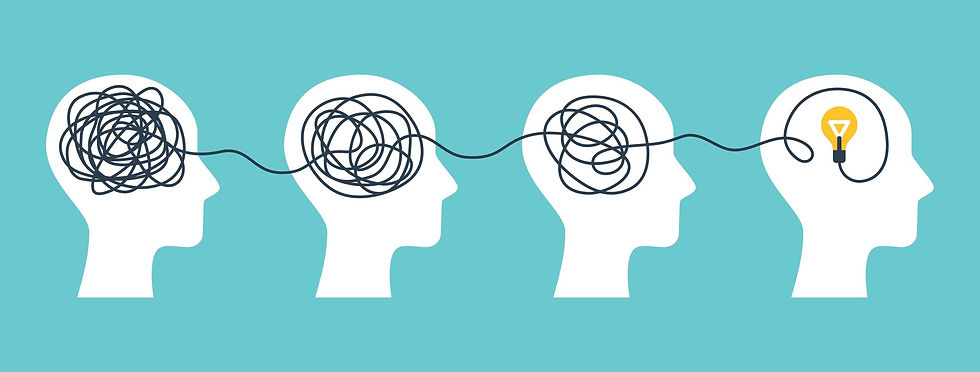What is Emotional Intelligence: The Key to Personal and Professional Success
- rfordham78
- Jul 1, 2024
- 3 min read

Emotional Intelligence (EI), often referred to as Emotional Quotient (EQ), is a vital aspect of our overall intelligence that influences our ability to navigate social complexities, manage relationships, and make informed decisions. Unlike cognitive intelligence (IQ), which measures logical reasoning and analytical skills, EI focuses on our ability to recognize, understand, and manage our emotions and the emotions of others. Here's a closer look at what emotional intelligence is and why it matters.
The Components of Emotional Intelligence
Emotional intelligence is typically divided into five key components:
1. Self-Awareness
Self-awareness is the ability to recognize and understand your own emotions. It involves being aware of how your emotions affect your thoughts and behaviors, knowing your strengths and weaknesses, and having a clear sense of your values and goals. Self-aware individuals are often more confident and better able to handle stress and challenges.
2. Self-Regulation
Self-regulation refers to the ability to manage and control your emotions, especially in stressful situations. It involves being able to pause and think before reacting, staying calm under pressure, and maintaining a positive outlook. People who can self-regulate are often adaptable, resilient, and capable of managing conflicts effectively.
3. Motivation
Intrinsic motivation is a key aspect of emotional intelligence. It involves having a strong drive to achieve goals for personal satisfaction rather than external rewards. Motivated individuals are usually more committed, persistent, and focused on long-term success. They often display a high level of initiative and a strong work ethic.
4. Empathy
Empathy is the ability to understand and share the feelings of others. It involves recognizing and being sensitive to others' emotions, perspectives, and needs. Empathetic individuals are often better at building relationships, resolving conflicts, and fostering a supportive and collaborative environment.
5. Social Skills
Social skills are essential for effective communication and relationship management. They involve being able to interact well with others, build rapport, and work as part of a team. Good social skills include active listening, clear communication, persuasion, and leadership abilities. Individuals with strong social skills are often more successful in both personal and professional contexts.
Why Emotional Intelligence Matters
Emotional intelligence has a profound impact on various aspects of life, including:
Personal Relationships
High EI helps individuals build and maintain healthier and more fulfilling personal relationships. By understanding and managing their own emotions, and being empathetic towards others, they can communicate more effectively and resolve conflicts constructively.
Professional Success
In the workplace, emotional intelligence is linked to better performance, leadership, and teamwork. Employees with high EI are often more adaptable, resilient, and able to navigate the social complexities of the workplace. Leaders with high EI are better at inspiring and motivating their teams, managing stress, and fostering a positive work environment.
Mental Health
Emotional intelligence is also closely connected to mental health. Individuals with high EI are generally better at managing stress, coping with challenges, and maintaining a positive outlook. This can lead to lower levels of anxiety and depression and a greater overall sense of well-being.
Developing Emotional Intelligence
The good news is that emotional intelligence can be developed and improved over time. Here are some strategies to enhance your EI:
1. Practice Self-Reflection
Regularly reflect on your emotions and behaviors. Journaling, mindfulness, and meditation can help increase self-awareness and emotional regulation.
2. Seek Feedback
Ask for feedback from trusted friends, family, or colleagues to gain insights into how others perceive your emotional interactions. Use this feedback to improve your empathy and social skills.
3. Learn to Manage Stress
Develop healthy coping mechanisms for managing stress, such as exercise, deep breathing, and relaxation techniques. Being able to stay calm under pressure is crucial for self-regulation.
4. Improve Communication Skills
Work on your communication skills by practicing active listening, expressing yourself clearly and assertively, and being mindful of non-verbal cues.
Emotional intelligence is a critical component of overall intelligence that plays a significant role in our personal and professional lives. By understanding and developing the key components of EI—self-awareness, self-regulation, motivation, empathy, and social skills—we can improve our relationships, enhance our performance, and achieve greater well-being. Cultivating emotional intelligence is an ongoing journey that can lead to a more fulfilling and successful life.



Comments